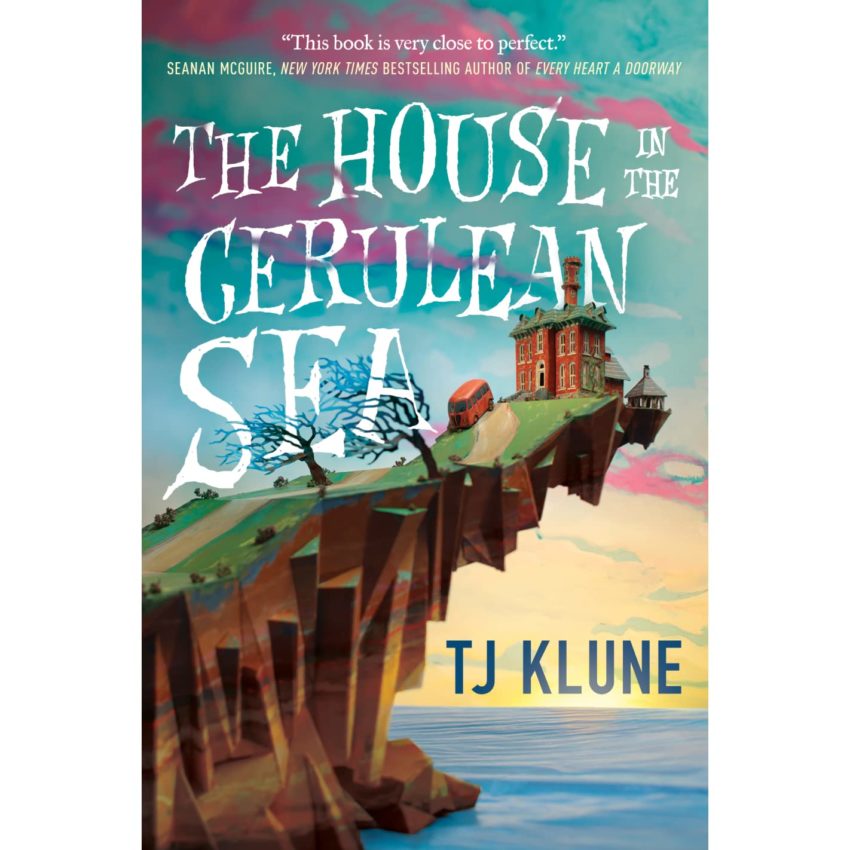By Riley Gonzales, Staff Writer
The House in the Cerulean Sea by TJ Klune is a heartwarming story of discovering love and acceptance in a fantasy setting. The book was published in 2020, the second-most recent of Klune’s works. The House in the Cerulean Sea is one of the novelist’s many young adult and adult fiction books featuring queer characters.
The story follows Linus Baker, a caseworker for the Department in Charge of Magical Youth (also known as DICOMY). Linus’s job is to visit orphanages housing magical children and determine if they are fit to remain open based on criteria from DICOMY. Linus has held this position for 17 years without much change, living a solitary life that is consumed by his work and his cat. On an unfortunate Wednesday morning—made even more unfortunate when he realizes it’s only a Tuesday—Linus receives a classified assignment from Extremely Upper Management, the head of DICOMY itself. It sends him to the Marsyas orphanage, home of the most dangerous magical youth. There he meets Arthur Parnassus, the master of the house, Zoe Chapelwhite, the island’s caretaker, and the six children that inhabit the orphanage: a female garden gnome, a forest sprite, an amorphous green blob, a were-Pomeranian, a wyvern, and the six-year-old son of Satan.
Linus Baker must determine whether or not the orphanage should remain open, and if the master of the house is fit to stay. The only problem? He never planned on getting attached to the people that lived there, and he was even less prepared to fall in love.
The House in the Cerulean Sea is a little different from what I typically read, but I loved it nonetheless. Its authentic characters captivated me, and just like Linus, I found myself caring about them before I even realized. Everything about this story was imbued with magical charm, from its distinct settings to its unique humor.
The novel has two main settings: the city and Marsyas, each with clear differences from the other. The book begins in a rainy, gloomy city. When it transitions to the town of Marsyas, which remains the setting for the majority of the story, it becomes bright, clear-skied, and colorful. This contrast goes beyond the environment and bleeds into the characters that inhabit each place until they reflect their surroundings. The workers at DICOMY are superficial and caricature-like with humorously exaggerated traits. They are strict and methodical rule-followers, just like the institution that employs them. However, when Linus gets to know the inhabitants of the Marsyas orphanage, they reveal themselves to be very real and relatable people. The children and their caretakers are as lively and bright as the island they live on. The characters being reflections of their surroundings not only further distinguishes the two settings, but also provides a comedic undertone to the otherwise depressing mood of the city while making Marsyas seem all the more raw and realistic.
Though Linus seems to have a rather lonely life when the book opens up, Klune never fails to make light of it. His use of satire and situational irony blends well with the world and provides much-needed relief from the emotional journey this book offers. Witty jokes made by the children (often to Zoe and Arthur’s amusement, and Linus’s frustration) are sprinkled throughout, making the characters even more endearing and the story an even greater joy to read.
TJ Klune’s writing style is full of charm laced with eloquence and emotion. He draws the reader in with immersive imagery, then convinces them to stay with his characterization and humor. Klune includes lines of dialogue that are rich with meaning. The story as a whole, despite lacking the adventurous plotline that so many fantasy novels tend to have, is a page-turner driven by the characters that Klune creates. This is a book I would recommend to fans of contemporary fantasy, romance, and found family, or anyone looking for their next comfort read.
The House in the Cerulean Sea’s vivid settings, interesting characters, unique humor, and emotional quality kept me enraptured all the way through to the end. TJ Klune expertly builds a vibrant world and introduces characters to match, then makes you fall in love with each and every one of them. By the end of it, you’ll be asking yourself a question about the quaint house in the cerulean sea that Linus often asks himself: “Don’t you wish you were here?”

